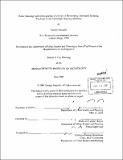Public housing authorities and the challenge of developing affordable housing : the case of the Cambridge Housing Authority
Author(s)
Samuels, George, 1974-
DownloadFull printable version (3.886Mb)
Other Contributors
Massachusetts Institute of Technology. Dept. of Urban Studies and Planning.
Advisor
Langley Keyes.
Terms of use
Metadata
Show full item recordAbstract
As housing and rent prices continue to rise in cities in the United States, it is becoming increasingly difficult for very low-income households to find decent affordable housing. Public Housing Authorities (PHAs), who are the main providers of housing opportunities to this population, are limited in their capacity to develop more housing units or provide more housing choices. With the elimination of the public housing development fund, and the government restrictions on their subsidy programs, PHAs can do little to address the housing issues. This paper explores a two-vehicle model as a conceptual framework for high-performing PHAs to increase the supply of affordable housing in their communities. The first vehicle is the creation of a nonprofit affiliate, which allows PHAs to act more like private developers. The second vehicle is participation in the Moving to Work Demonstration Program (MTW), which deregulates the PHAs' subsidy programs. The Cambridge Housing Authority's (Massachusetts) successful use of the two-vehicle model is examined.
Description
Thesis (M.C.P.)--Massachusetts Institute of Technology, Dept. of Urban Studies and Planning, 2001. Includes bibliographical references (leaves 51-54).
Date issued
2001Department
Massachusetts Institute of Technology. Department of Urban Studies and PlanningPublisher
Massachusetts Institute of Technology
Keywords
Urban Studies and Planning.